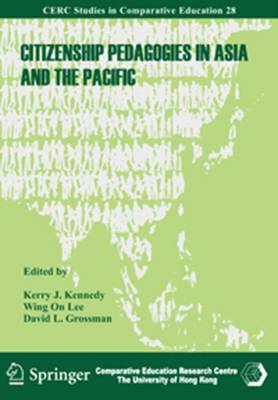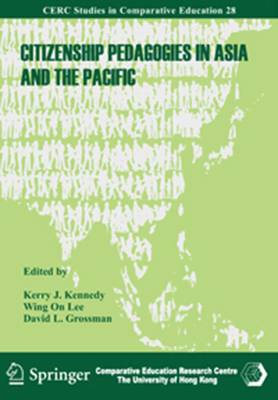
- Retrait gratuit dans votre magasin Club
- 7.000.000 titres dans notre catalogue
- Payer en toute sécurité
- Toujours un magasin près de chez vous
- Retrait gratuit dans votre magasin Club
- 7.000.0000 titres dans notre catalogue
- Payer en toute sécurité
- Toujours un magasin près de chez vous
Citizenship Pedagogies in Asia and the Pacific
Kerry Kennedy, Wing On Lee, David Grossman
Livre broché | Anglais
38,95 €
+ 77 points
Description
How are students in Asia and the Pacific taught to be effective citizens? Following two successful volumes previously published in this series, Citizenship Education in Asia and the Pacific Concepts and Issues and Citizenship Curriculum in Asia and the Pacific, this volume focuses on citizenship pedagogies that are promoted by governments in the region, advocated by scholars, and adapted in the schools and classrooms where citizenship education takes place every day. Thirteen case studies from diverse societies in Asia and the Pacific highlight the ways in which teachers and students think about, experience or plan for citizenship teaching and learning. Different methods--vignettes, student surveys, case studies and literature reviews--are used to portray these experiences, from both macro- and micro-analytic perspectives. The wide array of case studies provides rich information and insights into the realities and possibilities of pedagogies for citizenship across the region. What we discover from this volume is as diverse and complex as the region itself. Conservative teacher-dominated pedagogies are common in many places, but more progressive pedagogies can also be found. In some places teachers struggle to implement new methods, while in others, students seem to be more radical than their teachers in seeking more engaging pedagogies. Many cases highlight also the pressures of examination cultures that influence teachers' choices of and students' preferences for particular pedagogical approaches. From a comparative perspective, the volume shows how pedagogical approaches from other contexts are interpreted locally, and how government directives are adapted in classrooms. It describes how integrated and hybrid pedagogical approaches evolve when teachers in the region struggle to respond to national, global and person-oriented approaches to citizenship education. As curriculum gate-keepers, some teachers in these case studies seek an appropriate instructional space by judiciously choosing pedagogies to suit their own conceptions of citizenship education. For other teachers there are more limited choices, because of strong societal mandates, perceived community expectations, or simply because of a lack of skills to teach in any other way. Collectively these chapters constitute a remarkable study of the delivery of citizenship education across the region and of the variety of pedagogies that influence the lives of teachers and students in this context.
Spécifications
Parties prenantes
- Auteur(s) :
- Editeur:
Contenu
- Nombre de pages :
- 424
- Langue:
- Anglais
Caractéristiques
- EAN:
- 9789881785220
- Date de parution :
- 01-02-10
- Format:
- Livre broché
- Format numérique:
- Trade paperback (VS)
- Dimensions :
- 165 mm x 241 mm
- Poids :
- 703 g

Les avis
Nous publions uniquement les avis qui respectent les conditions requises. Consultez nos conditions pour les avis.






